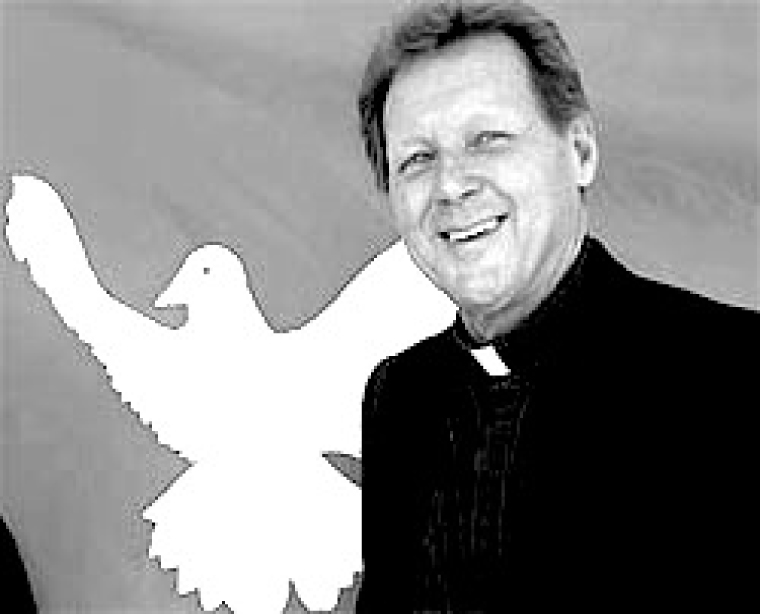By Zachary Tomanelli
Father Roy Bourgeois came to Ithaca College Sept. 24 to speak about U.S. – Latin American relations. Bourgeois is the founder of the School of the Americas Watch, a group that monitors activity of the military training school, now known as the Western Hemisphere Institute for Security Cooperation at Fort Benning, Ga., where many Latin American soldiers are trained in counterinsurgency methods. Bourgeois shared his experiences and thoughts on U.S. foreign policy.
Buzzsaw: What motivated you to start the School of the Americas Watch?
Father Roy Bourgeois: Nov. 16, 1989 was somewhat of a turning point. The thugs in Central America went after the Jesuits because they were educating the world about what was going on in their countries. They moved into the Jesuits’ campus in El Salvador, dragged six Jesuits out of their rooms along with two women co-workers. They were massacred. This made the front pages of newspapers around the world. It angered members of Congress who knew some of the Jesuits. They sent a congressional task force to investigate. They reported those who did the killing were trained at the U.S. Army School of the Americas at Fort Benning, Ga. So that’s when I and this small group of friends went to Fort Benning and started up the School of the Americas Watch. We knew very little about the school, and what we discovered was the school was well known in Latin America as a school of assassins. They trained over 50,000 soldiers—all funded by the U.S. taxpayer.
B: The School of the Americas Watch has been in existence for nearly 20 years. How would you rate the success of your organizing efforts?
FRB: The movement has just blossomed. We started with a small group, just 10 of us, and this last year we had 20,000 at the main gate in Fort Benning. I would say right now more than half in the movement are college and university students. And this is bigger than the SOA. For many, this is an introduction to our country’s foreign policy in Latin America, and then we start connecting to the Middle East and other parts of the world. It’s an introduction to activism. It’s an introduction to the struggle for justice. We’ve had four countries remove their troops from the school: Venezuela, Argentina, Uruguay and Bolivia.
B: We have just seen a military coup in Honduras. Based on what you understand about Latin America, how did that happen?
FRB: Here’s what happened in Honduras: Manuel Zelaya, who actually is very wealthy, comes from the landed elite and was brought into power by his friends—that’s the way it works. But something happened. He began to become more sympathetic, more compassionate toward the poor. It’s hard to describe. He doubled the minimum wage for the poor, for example. He started directing more money toward health and education for the poor. It infuriated the wealthy elite, and that is why the military removal took place.
B: How would you rate the U.S. response to the coup in Honduras?
FRB: We are a little more hopeful with the U.S. and the State Department under President Obama. But in the early days, he was saying the right things but not accompanied by actions. Now, it is good to hear President Obama and Hillary Clinton saying that the U.S. will not recognize the election if Honduras does not bring back President Zelaya. Obama said Zelaya is the democratically elected president and he must be brought back on unconditional terms. Years ago the U.S. would not have said what we are saying now. Under Bush, this would not have happened. I’m not saying Bush would have come out in support of Micheletti [the de facto Honduran president since the coup], but he would not have said Zelaya must return unconditionally. So there is some hope here.
B: Do you see U.S.-Latin American relations improving under the Obama administration?
FRB: One thing we said to our ambassador in Honduras is that they know our, meaning the U.S.’, track record very well in Central America—all of Latin America. There are so many governments and coups over the decades that we have supported, that we were behind. And the people there expect us to do what we have always done. We have been on the side of the militaries. We have been on the side of the very small wealthy elite who run the country. It is going to take a lot from our country to change that perception. For us to be trusted there has got to be some action—and they haven’t seen it yet. It would be like someone who for 20 years has been abusing another person physically and mentally, and all of a sudden comes in the room and says, “I changed.”
____________________________________
Zachary Tomanelli is a junior journalism major. E-mail him at ztomane1@ithaca.edu.
